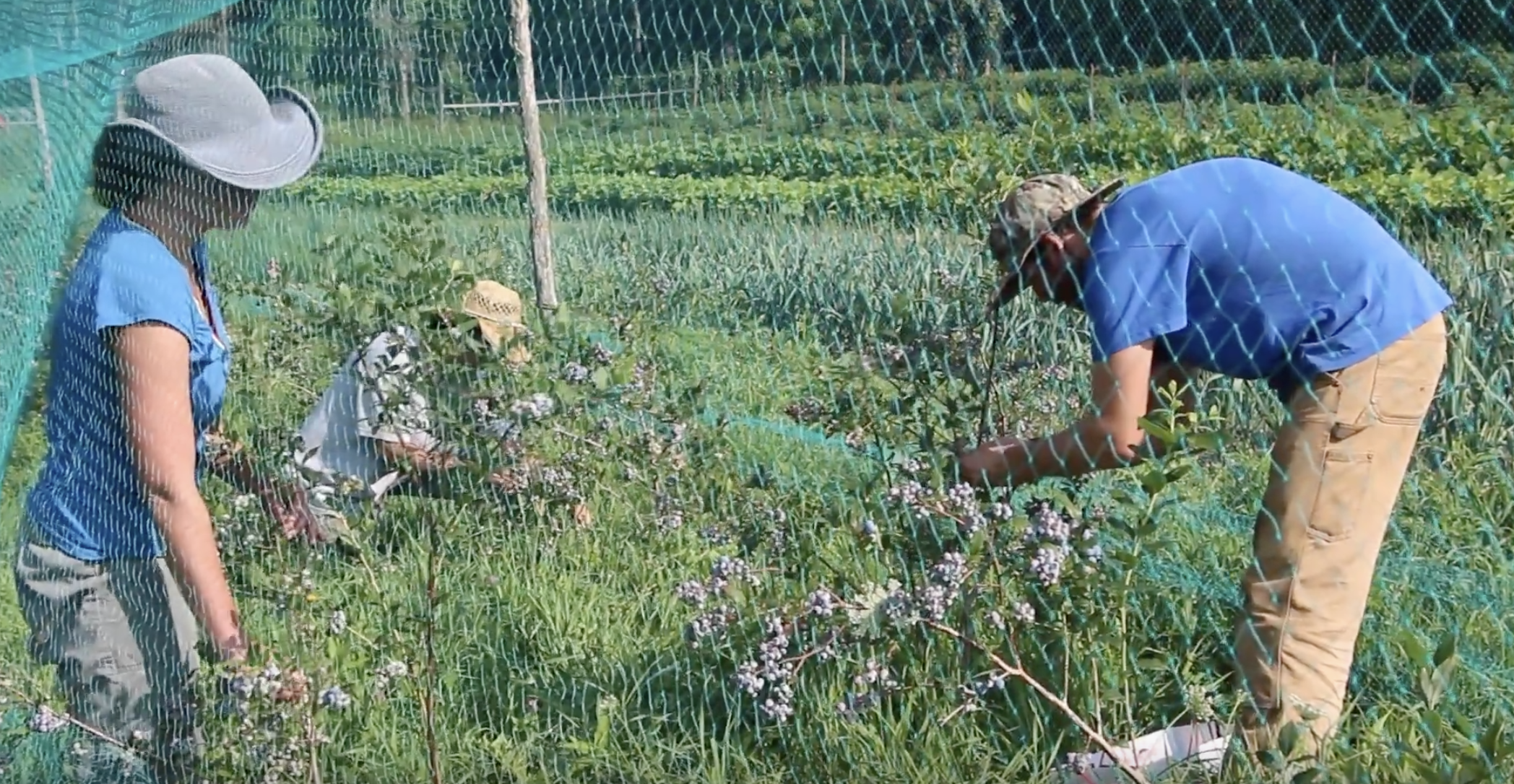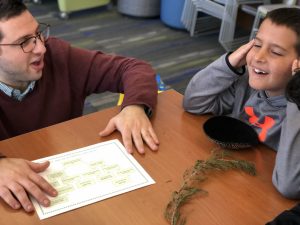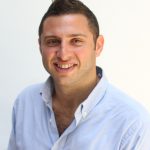Community Blog Rooted in Nature

What is the Hebrew word for nature? Teva.
Now, where in Jewish texts do we first see the word teva appear, meaning “nature?” When does it first appear as such?
How about the story of creation? “Let there be light?!” A garden? Humans formed from the earth itself? Nope.
Maybe Noah? The flood, the rainbow, the dove, all of nature destroyed? Nope.
What about Psalms, chock-full of references to nature everywhere you look. The trees shaking, the earth quaking, nature used as metaphors repeatedly? Nope.
In fact, the first time we see the appearance of teva meaning “nature” isn’t until the 12th century of the Common Era.
Originally, the Hebrew root of the word meant imprinted. Imprinted, like on a ring, or on a seal. Then that came to be used later, as imprinted, like that which is imprinted on us — our unique imprint, our unique “nature.”
Then RamBam uses the parallel Arabic root, a language that he was immersed in, to mean — in addition to our human nature — nature as in the natural world, like the trees and plants and sky.
Then Guide For the Perplexed gets translated into Hebrew and there we have the first mention of teva as “nature.”
So that’s fascinating and all, if you’re a linguistic lover, but then the question becomes: How could it be that Judaism didn’t have a separate word for “nature,” when we are a religion that is literally — and mythically — rooted in the natural world?
Take Sukkot for example. We are about to celebrate this Festival of Ingathering, one of our three Pilgrimage Festivals, when our ancient ancestors would literally make chag, pilgrimage, like haj in Arabic, with a crop or a bird or grain or livestock that they themselves had raised or grown. Our Sukkot, our temporary dwellings mark when we would erect pop-up huts in the fields during harvest time, so we could stay in the fields and harvest more efficiently. Or, they symbolize the pop-up tents we erected while back-country hiking through the wilderness. And then, bizrat haShem, we will all be in Sukkahs tomorrow evening at sundown, or sometime over the next eight days, with the full moon rising in the sky and schach draped above our heads, and we will intently and vigorously shake a bundle of symbolic plant species, wrapped together, in all six directions, while chanting magic incantations and walking in circles to draw forth rain from the sky, all while being extra cautious not to damage the pitom on the fruit in our other hand.
Our religion is rooted in nature. From Holidays to Psalms to Song of the Sea and creation and more.
So how do we not have a word for “nature” — depending on when you start the stopwatch — for at least the first 2,000 years of our religion, and that’s speaking conservatively?!
What do you think? Well, it was the water we were swimming in.
For Jews, there was no need to distinguish between God and the natural world, because the natural world was a manifestation of the Divine. An aspect of God. God and nature couldn’t be separated, because there was no nature without God, and there was no dividing line between the two.
Like the oneness of creation, when all the world was radiant light and all beings were translucent like the fingernail vestiges we recognize at our havdallah ritual, looking at our fingernails in the light of the havdallah candle. Like the oneness that we declare in the shemah. Like the oneness of the aleph in echad.
The way we treat nature — our imprint on the natural world around us — our nature, you could say, is also then a direct reflection of how we’re treating God. If God and nature can not be separated, then when we litter, we’re trashing God. And when we recycle, we’re keeping God green. That plastic bottle that we throw away, that will be God’s problem for the next 450 years, long after we’re gone.
And not only are we hurting God when we hurt nature, or pleasing God when we take care of it. But the same goes for ourselves:
Adam ha’rishon, that first human, we’re told in Genesis, in the garden of Eden, is created from the earth, adamah.
The text says (Gen 2.7):
וַיִּיצֶר יְהוָה אֱלֹהִים אֶת-הָאָדָם, עָפָר מִן-הָאֲדָמָה
And God formed the first human, from the dust of the earth…
וַיִּפַּח בְּאַפָּיו
And God blew into Adam’s nose
נִשְׁמַת חַיִּים
the life-breath of God, God’s living soul.
We are adam, humanity, formed from adamah, the earth. Or as Rabbi Arthur Waskow teaches, we are earthlings, formed from earth. We share a common root. We are — according to Judaism — our very substance is, the earth. So how are we going to treat it?
How are we going to treat it, knowing that the imprint we make on the Earth, we also feel.
The earth, a mirror for us of our collective nature — our collective imprint — on ourselves, on God Godself, and on this planet in which You, HaRachamah, the compassionate one, the Breath of All Life, the planet in which you are robed.
I ask us today: What is our nature? What imprint are we leaving? And what will our legacy be?

I’m so glad to be here this morning, celebrating Congregation Shaarey Zedek’s commitment to Hazon Detroit’s work, to sustainability and the environment, and to ensuring a healthier climate for tomorrow and today. As some of you may know, a large part of Hazon Detroit’s work locally, and a large part of Hazon’s work nationally, is through something called the Hazon Seal of Sustainability.
This is a program where Jewish organizations all around North America commit to becoming more “green,” through sustainability projects, organizational initiatives, and institutional changes.
This is really our flagship program, both locally and nationally, and something we’ll continue to be investing more and more resources into, because our focus is more and more becoming organizing individuals and organizations to make real, tangible, actionable changes. Taking concrete and impactful steps to heal the earth.
I’m really proud of this community, and you should be proud of yourselves, because you have been a Hazon Seal of Sustainability Site since we first launched our offices in Detroit, four years ago. Thanks to your “Green Team,” and the leadership by Rebecca Starr, who is also an Advisor to Hazon locally, and the support of your Rabbis, and executive team, and thanks to you all, in the last four years, with Hazon’s support, Shaarey Zedek has:
Hosted a “Green” Kiddush for Tu B’Shvat. Scaled up your recycling program on campus. Switched from styrofoam to glass cups at events. Purchased a Tower Garden to plant and grow in. Planted a wildflower garden and an outdoor classroom space. Hosted a green Shabbat. And you are currently participating in a new composting initiative.
This is amazing! You’re diverting waste from the landfill. You’re growing new life. You’re becoming more sustainable each and every year. Working towards a more zero-waste community and investing in fresh, local, food.
You’ve participated in Hazon’s Annual Michigan Jewish Food Festival for each of the Festival’s four years, and throughout our partnership, you’ve always been a great champion of Hazon and of this planet!
I want to make sure that we take a moment this morning for all of us to recognize all of your work! And I want to make sure to thank you, on behalf of Hazon, the earth, and future generations, for your continued commitment to sustainability and the health of this planet for these last four years and, God willing, many years to come. Congratulations!!
And… I wouldn’t be doing my job today, as a Hazon employee or a rabbi, if I didn’t make the case for us all to do more.
We know that our planet is not waiting on us, and while we may not know exactly what it will look like, we do know that the scope and scale of what we’re facing, when it comes to our changing climate, continues to mount. With eighteen of the 19 warmest years ever recorded in history, all having occurred since 2001, the call is clear — from our young people and from the earth itself — we must do more, we must love harder, and we must commit more deeply, to a Jewish ethic of sustainability.
What kind of planet do we want to leave as our legacy in the years to come? What kind of life conditions do we want to ensure for our future generations? And what can we do?!
You probably know the story of Choni the Circle Maker. Who was “one day journeying on the road.” You remember, right? “When he sees a woman planting a carob tree; He asks her, How long does it take [for this tree] to bear fruit? The woman replied: Seventy years. He then further asked her: Are you certain that you will live another seventy years? The woman replied: I found carob trees already grown when I came into the world. As my ancestors planted these for me, so I too plant these for my children.”
Now, I never really liked carobs. I think because I usually ate them as carob chips, in unsuspecting moments when I actually thought I was biting into chocolate chips…
But regardless, this righteous carob tree planter was onto something so critical for us and all ages. Not only was this elder planting something whose fruit and shade would be enjoyed by her grandchildren in 70 years, but she was planting something so central to our tradition, she was planting trees of life. These carob trees, like all trees: They are trees of life. For all who hold fast to them. And all of their supporters are happy!
Truly, they are trees of life. Etz hayyim hi, lamachazikim bah. Like our Torah sustains us, with its stories and its generational wisdom, its central meeting point across ages and its stable tether to keep us in relationship, so too, trees are the absolutely critical life-supporting organs of this world. Darchei no’am. Their paths are pleasant.
I know you know that. But in these days of raging fires and increasing carbon emissions, trees naturally act as our collective lungs and global carbon sequesterers. Not only do they help clean the air we breathe and produce oxygen for us to breathe, but they filter the water we drink, provide habitat to over 80% of the world’s terrestrial biodiversity, and serve as key ingredients in 25% of all medicine. And then, maybe most important of all, they also harvest the carbon that we put into the air, and store it, keeping it from its otherwise tragic fate of becoming just another harmful heap of damaging carbon amongst the rising global carbon emission totals.
Trees truly are alive. And they keep us alive.
So with that in mind… as people of the Scroll, Torah people, tethered to the Tree of Life, I want to ask for you, as individuals and as a community, to consider joining a new global Jewish project, to plant as many trees as we can in our communities. The project is going to be called J Tree and it is just currently emerging across a variety of partnerships and communities. Taking our well-worked muscles of giving money to have trees planted in our name, we must now do it more locally and with the environment in the front of our minds.
One of the founders of J Tree, R’ Marc Soloway, who also happens to be on the Hazon Rabbinic Council, is challenging his community in Colorado to plant 5,780 trees collectively this year, in honor of the year 5780, which we at Hazon are calling the Year of Environmental Teshuva. I wonder if Congregation Shaarey Zedek, as a community, could match that goal?
As more information about this new project is released, I will make sure to ask your Rabbis and team to share the information so that you can join the Jewish reforestation movement, the Jewish trees for life movement.
I’ll conclude with one final teaching this morning, which comes from Mishneh Pirkei Avot, and is inspired by R’ Soloway’s recent work around trees:
רַבִּי יַעֲקֹ֑ב אוֹמֵר, הַמְהַלֵּךְ בַּדֶּרֶךְ וְשׁוֹנֶה, וּמַפְסִיק מִמִּשְׁנָתוֹ וְאוֹמֵר, מַה נָּאֶה אִילָן זֶה וּמַה נָּאֶה נִיר זֶה, מַעֲלֶה עָלָיו הַכָּתוּב כְּאִלּוּ מִתְחַיֵּב בְּנַפְשׁוֹ
Rabbi Jacob said, if one is studying, while walking on the road, and interrupts their Torah study and says, “what a beautiful tree!” scripture considers that person liable for death.
Wait. What?! Really?! Stopping to smell the flowers is punishable by death in our tradition? How could a moment of nature appreciation or awareness of beauty be seen as a distraction so bad as to deserve the death penalty?! How can it be?
In the words of R’ Soloway, “Rav Kook, the first Chief Rabbi of Palestine, and others, teach that the key word in this text is mafsik, breaking off, separating. That is to say: If we understand the appreciation of a tree as an interruption from our studies, meaning, something separate from Torah, a break in our religious sensibility or intellectual curiosity, we might as well be dead. Spirituality is inherently an integration of body and soul, the earth and the heavens. A moment of nature appreciation isn’t an interruption to our wonder, but the source of it. Stopping to smell the flowers is not a break in Torah, it is Torah. And as long as we remember that, and act accordingly, our life, and perhaps life itself, remains intact.
As we go forth today, on Shabbat Parashat Ha’Azinu, on the precipice of the Promised Land and the eve of Sukkot, may we commit to imprinting the very best of our nature onto the nature around us. May we dare to think seriously about the legacy we wish to leave, and the responsibility we feel, to be the very best stewards of this earth that we can be, for those who are here already and for those who are on their way.
In these troubled times, may we hold fast to the steady wisdom and the life-giving power of the etz hayyim, the Tree of Life — may their memory be for a blessing. And may we, animated by a Jewish ethic of sacred stewardship, move quickly and concertedly to help reforest this planet one tree at a time, like Choni’s friend, the elder.
And in doing all of this, may we honor God, the earth, each other, and ourselves.
(Delivered at Temple Shaarey Tzedek in in Southfield, MI on October 12, 2019. Watch a video of this drash at 1:50.)


